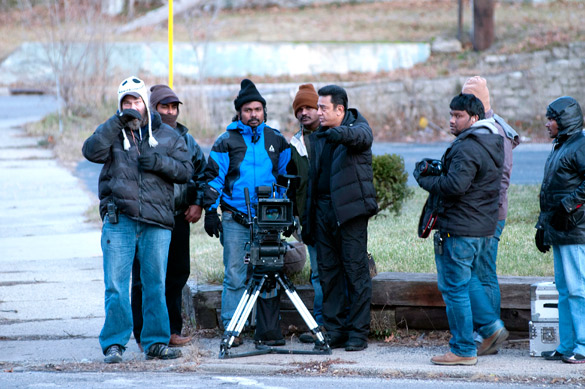|
Aakali Rajyam
''Varumaiyin Niram Sivappu'' () is a 1980 Indian Tamil-language satirical drama film written and directed by K. Balachander. The film stars Kamal Haasan and Sridevi, with Pratap Pothen, R. Dilip and S. Ve. Shekher in supporting roles. It revolves around a group of Tamils in Delhi struggling with poverty and unemployment. ''Varumaiyin Niram Sivappu'' was simultaneously shot in Telugu as ''Aakali Rajyam'' (). It was released on 6 November 1980, and ''Aakali Rajyam'' on 9 January 1981. The film was a commercial success, winning three Filmfare Awards South and Tamil Nadu State Film Awards. It was remade in Hindi as ''Zara Si Zindagi'' (1983) with Haasan reprising his role, and Balachander again directing. Plot S. Rangan and his friend are two unemployed Tamil men staying together in Delhi. Another Tamil, Thambu subsequently joins them for the purpose of searching a job. Rangan is a straightforward person who does not tolerate anything which involves impersonation and deceit. ... [...More Info...] [...Related Items...] OR: [Wikipedia] [Google] [Baidu] |
Kamal Haasan
Kamal Haasan (born 7 November 1954) is an Indian actor, filmmaker, screenwriter, playback singer, television presenter and politician who works mainly in Tamil cinema and has also appeared in some Telugu, Malayalam, Hindi, Kannada and Bengali language, Bengali films. He has been recognised as an influence for actors and filmmakers in the Tamil film industry. He is also known for introducing many new technologies and cosmetics to the Indian film industry. He has won numerous accolades, including four National Film Awards and 20 Filmfare Awards South, Filmfare Awards. He was awarded the Kalaimamani, Kalaimamani Award in 1984, the List of Padma Shri award recipients (1990–1999), Padma Shri in 1990, the List of Padma Bhushan award recipients (2010–2019), Padma Bhushan in 2014 and the Ordre des Arts et des Lettres (''Chevalier'') in 2016. Haasan started his career as a child artist in the 1960 Tamil language, Tamil-language film ''Kalathur Kannamma'', for which he won the Rashtr ... [...More Info...] [...Related Items...] OR: [Wikipedia] [Google] [Baidu] |
Poornam Viswanathan
Poornam Viswanathan (15 November 1921 – 1 October 2008) was an Indian actor who predominantly appeared in Tamil films. He started performing on stage at age 18. He worked as a reader for All India Radio and went on to act in films such as ''Chithram'', '' Varusham 16'', ''Thillu Mullu'', ''Keladi Kanmani'', ''Moondram Pirai'', ''Aasai'', ''Mahanadi'' and '' Varumaiyin Niram Sivappu''. He had a son and two daughters. Viswanathan died on 1 October 2008. Rediff.com (1947-08-15). Retrieved on 2011-08-09. Career Viswanathan was known for his remarkable performances in Tamil theatre and films. In every role he played, he paid great attention to dialogue delivery and body language. He started performing on stage when he was 18. He later moved to New Delhi for a few years, where he was part of the South Indian Troup ...[...More Info...] [...Related Items...] OR: [Wikipedia] [Google] [Baidu] |
Scroll
A scroll (from the Old French ''escroe'' or ''escroue''), also known as a roll, is a roll of papyrus, parchment, or paper containing writing. Structure A scroll is usually partitioned into pages, which are sometimes separate sheets of papyrus or parchment glued together at the edges. Scrolls may be marked divisions of a continuous roll of writing material. The scroll is usually unrolled so that one page is exposed at a time, for writing or reading, with the remaining pages rolled and stowed to the left and right of the visible page. Text is written in lines from the top to the bottom of the page. Depending on the language, the letters may be written left to right, right to left, or alternating in direction (boustrophedon). History Scrolls were the first form of editable record keeping texts, used in Eastern Mediterranean ancient Egyptian civilizations. Parchment scrolls were used by the Israelites among others before the codex or bound book with parchment pages was invented b ... [...More Info...] [...Related Items...] OR: [Wikipedia] [Google] [Baidu] |
Red Tape
Red tape is an idiom referring to regulations or conformity to formal rules or standards which are claimed to be excessive, rigid or redundant, or to bureaucracy claimed to hinder or prevent action or decision-making. It is usually applied to governments, corporations, and other large organizations. Things often described as "red tape" include filling out paperwork, obtaining licenses, having multiple people or committees approve a decision and various low-level rules that make conducting one's affairs slower, more difficult, or both. Red tape has been found to hamper organizational performance and employee wellbeing by meta-analytic studies in 2020. A related concept, administrative burden, refers to the costs citizens may experience in their interaction with government even if bureaucratic regulations or procedures serve legitimate purposes. Origins It is generally believed that the term originated with the Spanish administration of Charles V, King of Spain and Holy Roman Emp ... [...More Info...] [...Related Items...] OR: [Wikipedia] [Google] [Baidu] |
Nepotism
Nepotism is an advantage, privilege, or position that is granted to relatives and friends in an occupation or field. These fields may include but are not limited to, business, politics, academia, entertainment, sports, fitness, religion, and other activities. The term originated with the assignment of nephews to important positions by Catholic popes and bishops. Nepotism has been criticized since the ancient times by several philosophers, including Aristotle, Valluvar, and Confucius, condemning it as both evil and unwise. Origins The term comes from Italian word ''nepotismo'',"Nepotism." Dictionary.com. Retrieved 20 June 2013. which is based on Latin root ''nepos'' meaning nephew. Since the an ... [...More Info...] [...Related Items...] OR: [Wikipedia] [Google] [Baidu] |

.jpg)
